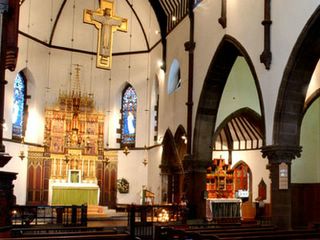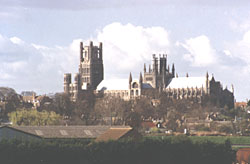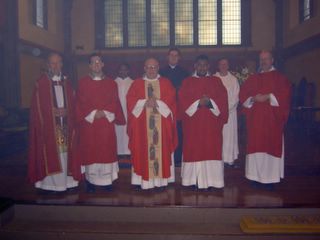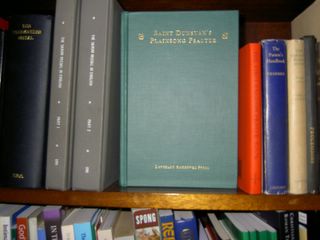 Who is like the Lord?
Who is like the Lord?Here is a Mystery Worshipper report that I submitted a few weeks back. It is the second that I have done, the first being about three years ago, back when I was a wishy-washy liberal. ;-)
Ian commented favourably on it in a comment in my birthday post (immediately preceding this one), and asked for clarification of British Catholicism.
I won't give a detailed history here, partly because that isn't the aim of my blog and also I am not qualified, but this is the basic story.
Before the unpleasantness of the 16th century, the western rite had many local variants - all very clearly having the same origins, but with local elements that developed for various reasons. The local
Uses, as they came to be known, were often diocesan, originating at the cathedral, and followed to a lesser degree in churches and chapels in each diocese. Some examples of British Uses are those of Exeter, York, Bangor, Hereford, and most well-known, Sarum (Salisbury). Westminster Abbey also had its own use, and the Westminster Missal was recently reprinted by the Henry Bradshaw Society. The Sarum Rite, in one form or another, eventually spread to most of Wales, the English south, Scotland and Ireland, and it is this that formed the basis for the Prayer Book of 1549.
Along with differences in the texts of the Mass were differences in the manner of observing certain days, and the ceremonial as well. For example, on Palm Sunday, whereas a palmesel (wooden figure of Christ on a donkey, on castors) was carted around in northern Europe, in the Sarum rite, the Blessed Sacrament was carried in procession instead. This, to me, makes infinitely more sense.
Genuflexion, for example, never formed a part of the Catholicism of the British Isles. Somebody from the pre-reformation period walking into an Anglo-Catholic parish today would perhaps wonder what on earth these people, bobbing up and down on one knee, were doing. A profound bow (from the waist) was the form of reverence given to the Most Blessed Sacrament.
Also, the surplice was full because of the colder British climate, so that the furs could be worn beneath it. Only on the continent did this take the form of a much closer-fitting garment, now known as the cotta. Both are regional variants of the same garment.
Two lights were used on the altar and no more. Although there would have been four - one on each riddel post, and two standards on the pavement, there were only ever two on the altar itself, and not on a shelf (or gradine) behind it.
The processional order was Clerk (carrying cross), then taperers carrying their lights, then thurifer, and then the Sacred ministers, for it was the priest who was seen as the icon of Christ by virtue of his ordination, and so the way was lit and censed for him. On the continent, it was the Cross that was seen as the icon of Christ, and so the thurifer walked before the Cross to cense the way for it, and the lights were carried on either side of the Cross.
The Blessed Sacrament was reserved in a hanging pyx, suspended above the high altar, and not in a bird ca..., er...
tabernacle on the altar.
When Queen Mary Tudor restored Catholicism to England, it would have been the Sarum rite that was used. In the late 16th century, the Roman Catholic Church did away with most of these regional variations in the Council of Trent as a reaction against the protestant reformation, and standardised everything in the form of the Tridentine Mass - a rite which did not develop naturally, but was imposed by council. The Church of England had already become established in the Prayer Book by this point, and as this had the rite of Sarum as its basis, it would make sense that Sarum ceremonial be used with it. This is the tradition that Blessed Percy Dearmer followed in defiance of the culture of many Anglo-Catholics and high churchmen of his day of rejecting anything not Roman as protestant.
There was, at the time, the idea that in order to be Catholic, it was necessary to follow the continental traditions, and so things like two lights on the altar, bowing to the Sacrament and not genuflecting, the use of the surplice, and other things that had been part of the Catholic tradition of Britain for centuries, were condemned as protestant by those who favoured more continental practices. This, of course, is total nonsense, but the fruits of such ideas are seen in many Anglo-Catholic churches today, where one could easily be forgiven for thinking that one were in Italy or Spain.
At my own church, we tend to be more Sarum then Roman, although we're the higher side of middle. S. Mary-the-Virgin, Primrose Hill is rather Sarum, which, I suppose, is Dr Dearmer's legacy. Holy Innocents' Fallowfield, in Manchester is also higher side of middle, and is more Sarum, although very low-key. There are a few parishes like that, and small traditions have lived on and jump out where you may least expect them.
The Sarum rite is also the rite used by the western rite Orthodox in ROCOR, and there is a link to the version of it that they use on the St Petroc Monastery website.
I apologise for the not-particularly-objective wording, but I really do feel strongly about this for, as I said in the report, this rejection of our own heritage is unhealthy, and seems to imply that the religion of our ancestors was inferior. I cannot accept this.










